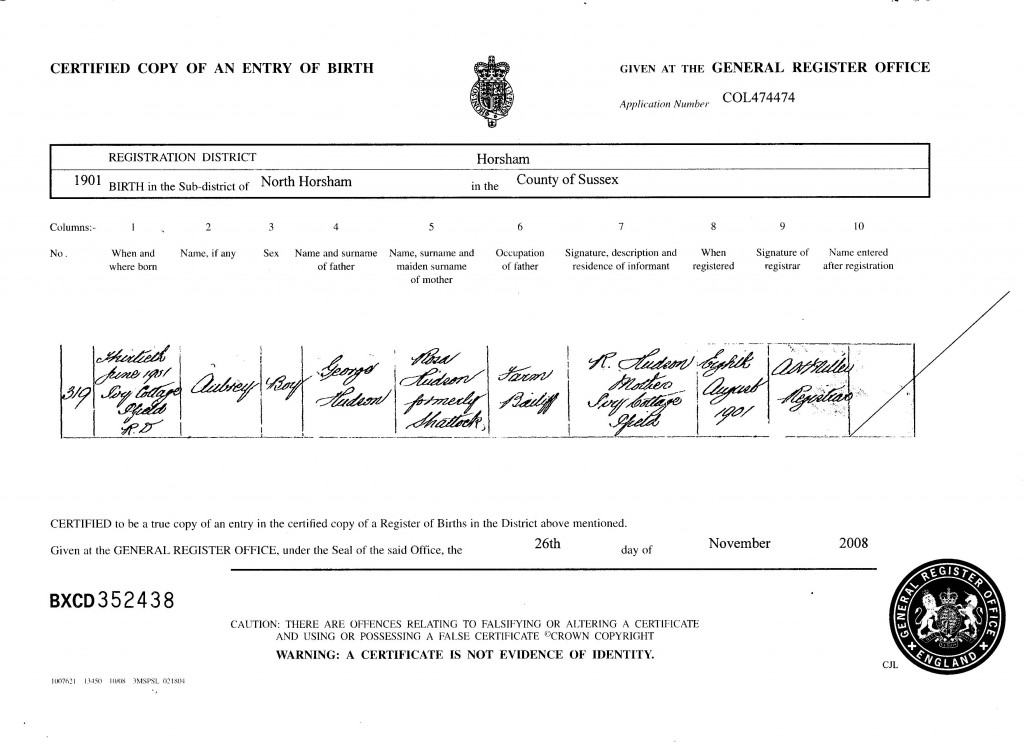Thank you to John Callcut for letting us reproduce the following information, taken from his book: A Village at War. Newdigate in World War One.

The records show that Aubrey Hudson was born in Ilfield in Sussex and was resident in the Rusper Road, Newdigate, when he enlisted into the army at Horsham at an unknown date. He was the awarded the Victory Medal and the Bristish War Medal. Aubrey Hudson was born on the 30th June 1901 so he would have been just over fifteen years of age when he met his death. He grew up in an old timber framed cottage called Ivy Cottage, which can still be found in Langley Lane in Ifield, with his father (a Yorkshireman called George), his mother (a local woman called Rosa), and his older brother George and younger brother, Walter David. His grandfather farmed 210 acres at Howsham in Yorkshire and in the 1890’s his father travelled south to manage the farm in Ifield, before later moving to Home Farm in Newdigate.
According to Reginald Trow (1901-1986), who remembered him, Aubrey was a tall lad and good at boxing; he joined up at a very young age. John Steed, the headmaster at Newdigate School, had reason to enter his name in the punishment book on five occasions from January until September 1914 for such crimes as ‘generally slack, talking and inattention, careless writing and spelling, talking and being idle’. Aubrey joined the 22nd Battalion Royal Fusiliers which was raised by the Mayor of Kensington in response to Lord Kitchener’s appeal in September 1914.
The new battalion, 1000 strong, was billeted in Horsham and Roffey for intensive training, so perhaps this was when Aubrey Hudson enlisted. In June 1915 they left Horsham for further training in Clipstone and then to Tidworth on Salisbury Plain, before finally leaving for France on the 16th November 1915 under the popular command of Major R. Barnett Barker (later Brig-Gen R. Barnett Barker D.S.O. and Bar, who was to die on the 25th March 1918 when he was hit by a stray shell at Guedecourt whilst commanding the 99th Infantry Brigade).
The ‘History of the 22nd Battalion’ takes up the story: ‘Christmas was spent on the front line but by May the Battalion was in the Vimy Sector. With July came the Battle of the Somme but it was not until the 20th July that they went south to Amiens and then marched to Montauban and Delville Wood where they arrived on the 25th.
The march had been exhausting and exciting, through the old front lines and into the tortured, littered area of the stinking battle ground: such artillery fire, such debris, such smells, such confusion were all new experiences, and to these were added during the next few days the whirr and plop of tear-shells and gas-shells to add to the general discomfort. At 3.00 a.m. on the 27th C and D Companies moved to some trenches in the Valley, and H.Q. to a ditch at the road-side near the bottom of Bernafay Wood, while A and B companies were organized into carrying parties. (Aubrey Hudson was with B Company in Delville Wood and the action of that day saw four officers and 26 other ranks killed and 143 wounded.) The communication trench to the wood, Longueval Alley, was a shambles, full of dead or sleeping men, and the open ground was swept by shell-fire continuously; so the exhaustion of the carrying parties can be neither imagined nor described.’
Aubrey Hudson died on the 28th July 1916 and his body was never found. On the following day the battalion, now consisting of just 18 officers and 400 other ranks, was withdrawn from the front line.
After the war an Old Comrades’ Association was formed and the following message was distributed to the next-of-kin of their fallen comrades.
‘We, the first General Meeting of the survivors of the 22nd (Kensington) Battalion of the Royal Fusiliers, wish to express to you, the relatives of our comrade who gave his life for our King and Country, the deep and unfailing honour in which we hold his memory. We, who knew something of the daily hazard of life on the Western Front – how one man is taken and the other left, how death may come in an instant or after hours of suffering; we, who are proud of our battalion and of the spirit that animated it throughout its history, wish to place on record at this first opportunity our gratitude to our fallen comrades for the example and the inspiration that they gave us in their lives and by their deaths. And we pray for you, who waited in suspense and at the end heard the grievous tidings from across the sea, that God may comfort you in your loss, and that pride in the record of our Battalion may temper the bitterness of your sorrow.
Aubrey’s name is recorded on the Thiepval Memorial and also on a plaque in the vestry at Newdigate church which was hand-carved by William Broughton in memory of the members of Mrs Janson’s wood carving class who died during the war. If he joined the regiment when it was billeted in Horsham, then he would have been under 14 years of age at the time of his enlistment.
| Born | Ifield, West Sussex | |
| Lived | Newdigate, Dorking, Surrey | |
| Son of | George and Rosa Hudson of Newdigate, Surrey | |
| Enlisted | Horsham | |
| Regiment | 22nd Battalion. Royal Fusiliers | |
| Number | 1986 | |
| Date of Death | 28th July 1916 | |
| Place of Death | Somme, France | |
| Cause of Death | Killed in Action | |
| Age | 15 | |
| Memorial | Thiepval Memorial, Somme, France |

